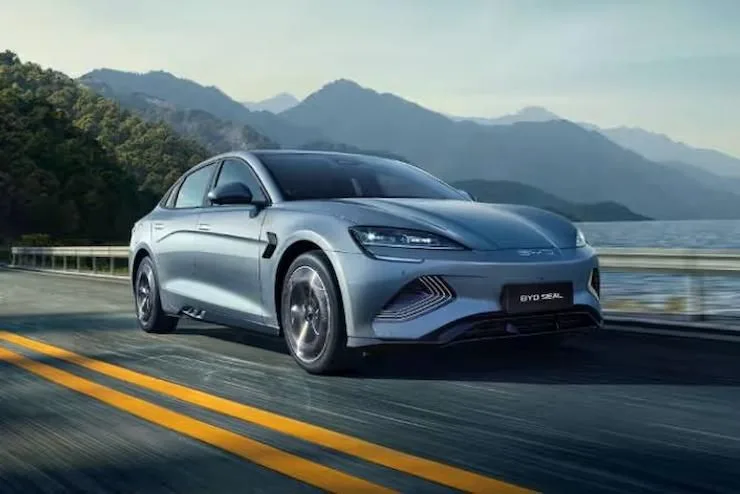In a landmark development for India’s electric vehicle sector, BYD India has announced plans to establish a massive EV manufacturing plant near Hyderabad. The Chinese automotive giant is set to invest ₹85,000 crore (approximately $10 billion) in this facility, marking one of the largest private investments in India’s growing EV industry.
The investment by BYD India represents a significant vote of confidence in the country’s electric mobility future and could potentially reshape the competitive landscape of India’s automotive sector. With this new facility, BYD India aims to produce 600,000 vehicles annually by 2032, along with a 20 GWh battery production capacity.

Contents
BYD’s Ambitious Manufacturing Plans for India
BYD India (primary keyword): “BYD India’s Massive Investment in Telangana”
The BYD manufacturing facility will be built on over 500 acres of land in Telangana, with the state government offering substantial incentives to secure this investment. These incentives include full exemption from road tax and registration fee waivers until December 31, 2026, along with dedicated land allocation support.
“This investment marks a significant milestone for electric vehicle manufacturing India has seen in recent years,” said an industry analyst who requested anonymity. “The scale of this project indicates BYD’s serious commitment to the Indian market.”
The Chinese automaker, which has had a presence in India since 2007, is currently evaluating three potential sites for the plant. Once complete, the BYD manufacturing plant will have a 20 GWh battery production capacity, enabling the company to produce its advanced Blade batteries locally.
Key Details of BYD’s Manufacturing Facility
| Aspect | Details |
|---|---|
| Investment | ₹85,000 crore (~$10 billion) |
| Location | Near Hyderabad, Telangana |
| Land Area | Over 500 acres |
| Vehicle Production Capacity | 600,000 units annually by 2032 |
| Battery Production | 20 GWh capacity |
| Current Status | Site evaluation of three proposed locations |
| Existing Operations | Assembly base in Tamil Nadu (electric buses) |
This BYD manufacturing initiative represents a ₹85,000 crore investment in India’s EV future and will be implemented in phases. The company is currently in the initial phase, which includes site selection, infrastructure development planning, and securing regulatory clearances.
The Impact on India’s EV Market
Chinese EV companies (secondary keyword): “How Chinese EV companies Are Reshaping India’s Automotive Future”
BYD is one of the leading Chinese EV companies making significant investments globally. The company’s entry into India’s manufacturing sector comes at a time when the country’s EV market is poised for explosive growth.
According to industry projections, India’s EV market is expected to reach $113.99 billion by 2029, growing at a compound annual growth rate (CAGR) of 66.52% between 2022 and 2029. The EV battery market alone is projected to reach $27.70 billion by 2028.
The new plant will significantly increase the production capacity for BYD EVs in the region. Currently, EV adoption in India stands at around 2%, but with major investments like BYD’s, this figure is expected to rise substantially in the coming years.
“Unlike other Chinese EV companies, BYD has had a presence in India since 2007, primarily in the electric bus segment,” noted an automotive industry consultant. “This gives them a unique understanding of the Indian market and its challenges.”
Market Growth Projections
| Metric | Value | Target Year |
|---|---|---|
| EV Market Size | $113.99 billion | 2029 |
| CAGR | 66.52% | 2022-2029 |
| EV Battery Market | $27.70 billion | 2028 |
| Current EV Adoption | 2% | 2025 |
The success of Chinese EV companies in India depends on overcoming regulatory challenges, including historical constraints on Chinese investments. However, recent policy shifts show positive signs for companies like BYD.
Competitive Landscape and Strategic Implications
BYD EVs (secondary keyword): “The Growing Market for BYD EVs in India”
Indian consumers have shown growing interest in BYD EVs over the past few years. The company currently sells models like the e6 MPV and the Atto 3 SUV in India, with plans to introduce more affordable options.
The competitive landscape in India’s EV market is currently dominated by domestic players, with the top four manufacturers controlling 75% of the market share. These companies enjoy strong localization advantages and established distribution networks.
However, BYD brings several strategic advantages to the table:
- Advanced Blade battery technology, which offers improved safety and energy density
- Established presence in India since 2007, particularly in the electric bus segment
- Vertical integration capabilities, from battery production to vehicle assembly
The localization of production will likely reduce the cost of BYD EVs in the Indian market. The company is reportedly developing a sub-Rs 20 lakh vehicle specifically for Indian consumers, which could help it capture a significant market share.
“BYD’s entry coincides with Tesla’s interest in the Indian market,” said an industry observer. “This sets the stage for an interesting competition between two global EV giants in an emerging market.”
Challenges and Opportunities
Electric vehicle manufacturing India (primary keyword): “The Future of Electric Vehicle Manufacturing India Faces”
Despite the promising outlook, BYD faces several challenges in establishing its manufacturing presence in India:
- Investment Restrictions: Historical constraints on Chinese investments have created regulatory hurdles, though recent policy shifts show positive signs.
- Market Entry Barriers: Localization requirements involve a 4-year process, and the price sensitivity of the Indian market presents additional challenges.
- Competition: Established players like Tata Motors and Mahindra & Mahindra are already making significant strides in the EV space.
However, the opportunities are equally substantial:
- Job Creation: The establishment of a large-scale manufacturing facility is expected to create numerous jobs, both directly in the plant and indirectly through the supply chain.
- Skill Development: As a leader in EV technology, BYD’s presence could facilitate knowledge transfer and skill development in advanced automotive manufacturing.
- Supply Chain Development: The plant’s establishment may attract other component manufacturers and suppliers, potentially creating an EV manufacturing ecosystem in the Hyderabad region.
The future of electric vehicle manufacturing India is looking promising with such major investments. Government policies have been supportive of electric vehicle manufacturing India needs to compete globally, including the FAME II scheme and Production Linked Incentive (PLI) scheme for Advanced Chemistry Cell (ACC) battery storage.
Strategic Market Positioning
BYD’s strategy for the Indian market appears to focus on:
- Affordable EVs: Developing models specifically for the price-sensitive Indian market
- Expanded Reach: Plans to increase dealership network from 27 to 47 outlets
- Localized Production: Reducing costs through local manufacturing
- Supply Chain Development: Creating an automotive cluster around Hyderabad
“With this investment, BYD is not just entering the Indian market but potentially positioning India as an export hub for EVs,” explained an industry expert. “This aligns perfectly with India’s ‘Make in India’ initiative.”
Conclusion: A Transformative Investment
BYD’s planned investment in India represents more than just another manufacturing facility. It signals a significant shift in India’s automotive landscape toward electrification and could accelerate the country’s transition to sustainable mobility.
The scale of the investment, combined with BYD’s technological expertise and global experience, positions the company to play a major role in India’s EV future. As the facility progresses from planning to production, it will be fascinating to watch how this development influences India’s automotive industry, consumer choices, and environmental goals.
For India, this investment offers a pathway to becoming a global hub for EV manufacturing while creating jobs, developing skills, and building a robust supply chain ecosystem. The road ahead may have challenges, but the destination—a cleaner, more sustainable transportation system—seems increasingly within reach.

